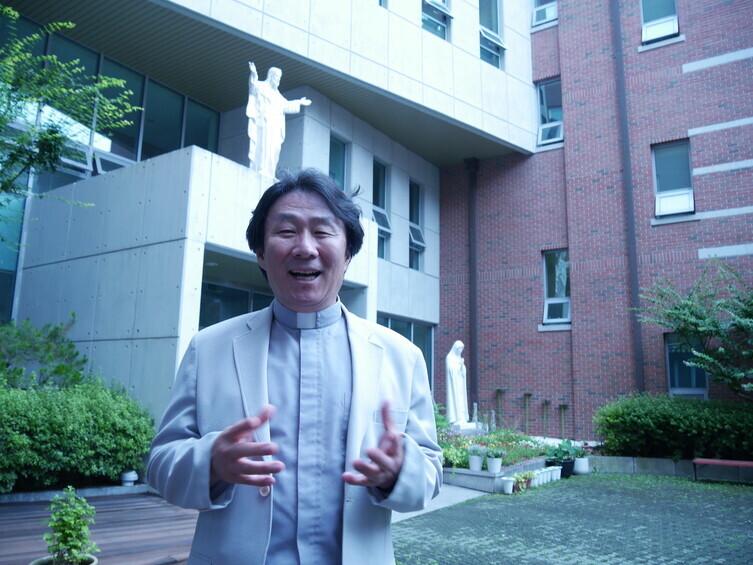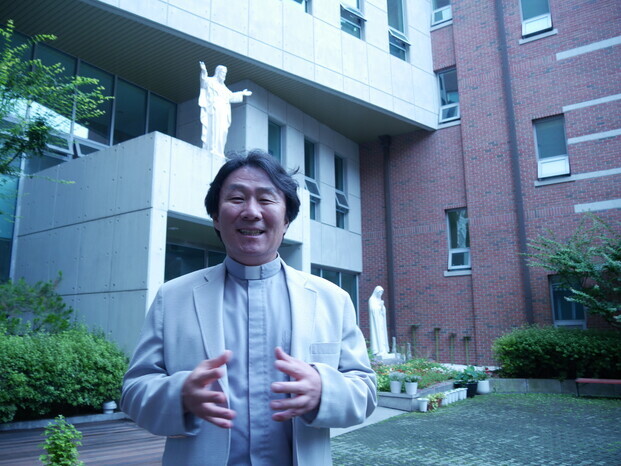hankyoreh
Links to other country sites 다른 나라 사이트 링크
[Interview] Dear Korean men, It’s OK to admit you’re not always strong

We were once used to “we” more than “I,” but fast forward to now, we are in an age where “I” comes before “we.” Amidst competition and the survival of the fittest, division across class, politics, and gender lines is becoming more prominent and communication between individuals is being blocked off. That’s why living life together is all the more longed-for. Even if we’re lonely, even if we’re sad, together we can endure. For this installation in our series “Life Is Happier Together: Hearing from Everyday Masters” by the Hankyoreh and Platon Academy, we hear from the Rev. Kim Jeong-dae, 61, a Jesuit priest.
The Rev. Kim Jeong-dae published a book with a rather provocative title: “Why Do Men Do the Most to Live in Misfortune?” (Bao Publishing). He doesn’t mean to rub salt in the wounds of men, who can’t seem to catch a break these days. As its subtitle, “Rediscovering the Place of Men,” suggests, the book is infused with the hope that men will shirk off the pressure thrust upon them since childhood — the pressure to live a “manly” life — and become happy as individual human beings.
Kim, who went abroad to Australia in 2016 and wrote his master’s thesis in theology on relational spirituality in unemployed men, has come out with a “report on Korean men” based on his thesis. On Monday, the Hankyoreh met with Kim at the Jesuit Center in the Daeheung neighborhood of Mapo District in Seoul to hear why Korean men are more vulnerable to economic crisis.
“Korean men have been raised to determine their meaning of existence as men based on their productivity,” Kim shared. “That’s why, as soon as they become unemployed, they feel as if they have been castrated and lose their meaning of life.”
“Unemployed Koreans become unusually listless,” Kim said, “so much so that my faculty advisor in Australia thought it peculiar that during crises like the IMF bailout, unemployed Korean men left the house in the morning even without jobs to go to because they couldn’t stand being home.”
Korean men think losing one’s economic ability is a big deal, so big that many unemployed men endure the weight of life on their own before isolating themselves and going to a mountain and circling the trail or running away from home, or even going so far as to take their own lives. In other words, they believe they have lost everything when labor is merely one part of life. Korean men are not the only ones experiencing economic ups and downs, so why do they take economic crises harder?
“Korean men become isolated in crisis situations like this because they cannot reveal their vulnerabilities to their family, because they have not formed an intimacy with their family. Korean men think being competent and having money is everything, but that myth is wrong,” Kim noted. “Intimacy is not formed through competence. Intimacy forms more deeply not when one is showing off how competent one is, but when one is sharing one’s vulnerabilities.”
Unemployed men are unable to blend in with their families and at times have been known to take their own lives because they are unable to be open about their vulnerabilities. Kim analyzed that this is because men “cannot see the emotions surging up from inside of them,” and “take pains to ignore them.”
Then why are Korean men particularly emotionally dull? Kim said the reasons are Confucian culture, military culture, and domestication into authoritarianism through anti-communist education. Because a culture of violence that creates a hierarchy whereby a person of higher rank forces a person of lower rank to accept their authority was reproduced through military culture, a culture of patriarchy took root within the home, becoming entrenched within corporations as well.
That’s why men submit to people of higher rank to the point of obsequiousness while, when it comes to people of lower rank, they domineer and mete out inhumane treatment to the point of mean-spiritedness. Because of this, they merely strive to reach higher and higher ranks in order to dominate people or not be ignored, believing that losing status is like falling off a cliff because they haven’t learned how to listen closely to another’s words and empathize.
“Why do Korean men cling to occupation or status, unable to live true to themselves? Because of a culture that overly emphasizes the mask of persona. Because this makes them misunderstand their social roles like their occupation or status as their true selves, they only take interest in what’s on the outside, stoking their desire to reach a higher rank, misjudging that losing that status is like losing everything,” the reverend shared.

Kim asked men to ask themselves seriously, “Who am I?” There was a time when he found his true self through a schism between social norms and himself. Before joining the Society of Jesus, he was an engineer at a chip company. When the firm’s labor union went on strike in 1989, the company declared a lockout and ordered him to prevent the strike. Although the company demanded he act on behalf of management, he rejected, feeling guilty; eventually, he was suspended for one month by the personnel committee, threw off the “persona” he had been forced to wear, and joined the Jesuit order.
Though he became a priest, he didn’t remain confined to the persona of a priest. He ran a pub for laborers called Window to Life in Incheon for seven years from 2004 to 2011, serving drinks and food himself. Moreover, recently, he has been teaching a cooking class for men, guiding his students to grow empathy through cooking.
For Korean men who cannot look into nor express or share their feelings or form intimacy due to a stiff social structure and culture, Kim shared words of blessing he usually shares with acquaintances at occasions such as weddings, giving Korean men the courage to reveal their vulnerabilities.
“Are you sufficiently vulnerable enough to be loved, or to love? That’s all it takes to be loved,” said Kim. “It’s perfectly fine to be vulnerable, and it’s perfectly fine to admit that you are.”
By Cho Hyun, religion correspondent
Please direct questions or comments to [english@hani.co.kr]

Editorial・opinion
![[Column] Life on our Trisolaris [Column] Life on our Trisolaris](https://flexible.img.hani.co.kr/flexible/normal/500/300/imgdb/original/2024/0505/4817148682278544.jpg) [Column] Life on our Trisolaris
[Column] Life on our Trisolaris![[Editorial] Penalties for airing allegations against Korea’s first lady endanger free press [Editorial] Penalties for airing allegations against Korea’s first lady endanger free press](https://flexible.img.hani.co.kr/flexible/normal/500/300/imgdb/original/2024/0502/1817146398095106.jpg) [Editorial] Penalties for airing allegations against Korea’s first lady endanger free press
[Editorial] Penalties for airing allegations against Korea’s first lady endanger free press- [Editorial] Yoon must halt procurement of SM-3 interceptor missiles
- [Guest essay] Maybe Korea’s rapid population decline is an opportunity, not a crisis
- [Column] Can Yoon steer diplomacy with Russia, China back on track?
- [Column] Season 2 of special prosecutor probe may be coming to Korea soon
- [Column] Park Geun-hye déjà vu in Yoon Suk-yeol
- [Editorial] New weight of N. Korea’s nuclear threats makes dialogue all the more urgent
- [Guest essay] The real reason Korea’s new right wants to dub Rhee a founding father
- [Column] ‘Choson’: Is it time we start referring to N. Korea in its own terms?
Most viewed articles
- 1New sex-ed guidelines forbid teaching about homosexuality
- 260% of young Koreans see no need to have kids after marriage
- 3[Column] Life on our Trisolaris
- 4OECD upgrades Korea’s growth forecast from 2.2% to 2.6%
- 5Presidential office warns of veto in response to opposition passing special counsel probe act
- 6Months and months of overdue wages are pushing migrant workers in Korea into debt
- 7[Guest essay] Maybe Korea’s rapid population decline is an opportunity, not a crisis
- 8Trump asks why US would defend Korea, hints at hiking Seoul’s defense cost burden
- 9[Editorial] Penalties for airing allegations against Korea’s first lady endanger free press
- 10Japan says it’s not pressuring Naver to sell Line, but Korean insiders say otherwise